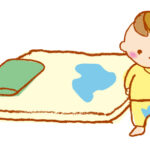Bedwetting, also known as nocturnal enuresis, is a common problem among children, and it can last into adolescence or adulthood for some. While bedwetting is a physical issue, it can have emotional and psychological consequences for children, especially if it persists for an extended period. The following are some long-term psychological effects of bedwetting:
-
Self-Esteem Issues
Self-esteem refers to a child’s perception of themselves in relation to others. Long-term bedwetting can harm a child’s mental health, primarily if parents do not provide adequate support during this time. A Swedish study discovered that children who wet their beds had significantly lower self-esteem than children who did not have this problem. Another study of primary school children discovered that bedwetting was the third most distressing experience on a list of 11 difficult life situations. The only things more upsetting than bedwetting were when parents divorced and when they argued loudly. Bedwetting was more distressing to these children as compared to being teased frequently by their peers, which came in fourth place on the list. Another study published in 2018 discovered that girls who wet their beds before the age of 14 had significantly lower self-esteem than those who did not.
-
Feelings of Guilt and Shame
Bedwetting is often associated with feelings of guilt and shame among children. How parents respond to their child’s difficulty also impacts their view of the problem. If a child is punished for bedwetting, it can harm their mental health. The child may also feel anger towards themselves, making the problem worse.
-
Social Anxiety and Isolation
When a child goes through bedwetting, they may also develop a fear of being discovered and teased about their problem. An English study found that bedwetting can have a significant negative impact on a child’s social life. They are less likely to participate in social interactions and may also avoid social situations such as sleepovers and family gatherings. The problem can get worse if children are bullied or teased regarding their bedwetting. It may also lead them to avoid school. If the child is teased, it may also lead them to feel lonely and isolated. A study conducted in England had similar results, where it was found that children who wet their bed during the day had increased difficulties with peer relationships in adolescence.
-
Sleep Issues
If bedwetting continues for a long time, it might affect the child’s quality of sleep. The child may even go on to develop feelings of stress while going to sleep, which may make the bedwetting worse. A 2020 study in China discovered that bedwetting was associated with poor sleep quality in children.
-
Depressive Symptoms
Long-term bedwetting can contribute to the development of depressive symptoms in some children. According to a 2014 study, children who were punished by their parents for bedwetting were more likely to suffer from depressive symptoms and have a lower quality of life. A 2017 study found similar results. The study discovered that females who had bedwetting in adolescence were more likely to have depressive symptoms.
Conclusion:
Bedwetting can be a difficult issue to handle for both parents and children. It is important for parents not only to get the condition treated but also to ensure that they remain supportive of their child. After all, bedwetting is a treatable condition. If parents treat the condition with support, most of the negative psychological impact of the condition can be managed as well.
Want to learn more about the causes of bedwetting? Read our article on the psychological causes of bedwettingReferences:
- admin. (2017, August 16). The Psychological Effects of Bed-wetting, Daytime Urinary and Fecal Incontinence. Physical Therapy Specialists. https://www.ptspecialist.com/the-psychological-effects-of-bed-wetting-daytime-urinary-and-fecal-incontinence/
- Grzeda, M. T., Heron, J., Von Gontard, A., & Joinson, C. (2017). Effects of urinary incontinence on psychosocial outcomes in adolescence European Child & Adolescent Psychiatry, 26(6), 649–658. https://doi.org/10.1007/s00787-016-0928-0
- Huang, H.-M., Wei, J., Sharma, S., Bao, Y., Li, F., Song, J.-W., Wu, H.-B., Sun, H.-L., Li, Z.-J., Liu, H.-N., Wu, Q., & Jiang, H.-L. (2020). Prevalence and risk factors of nocturnal enuresis among children ages 5–12 years in Xi’an, China: A cross-sectional study. BMC Pediatrics, 20(1), 305. https://doi.org/10.1186/s12887-020-02202-w
- Lefeber, T. P. (2018). Psychological Aspects of Enuresis in Childhood. Annals of Urology & Nephrology, 1(1). https://doi.org/10.33552/AUN.2018.01.000503
- myVMC. (2012, February 27). Impact of Bed Wetting. myVMC. https://www.myvmc.com/lifestyles/impact-of-bed-wetting/
- The Impact of Bed Wetting on Children | Happy Dry Nights. (2021, December 24). https://www.happydrynights.com.au/the-impact-of-bed-wetting-on-children/

